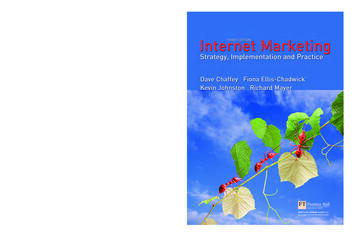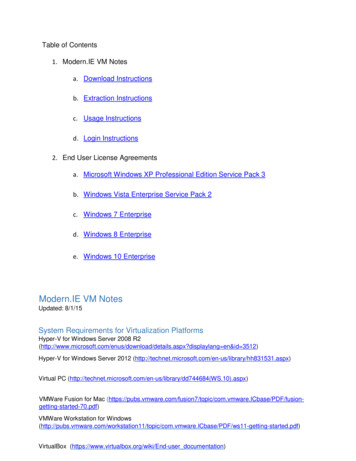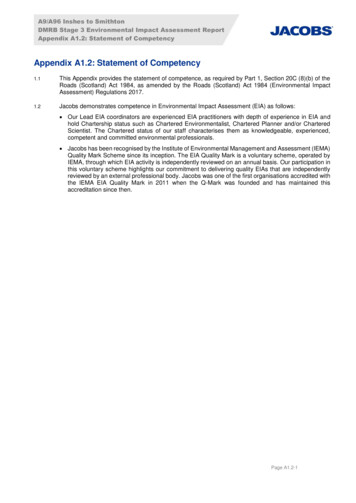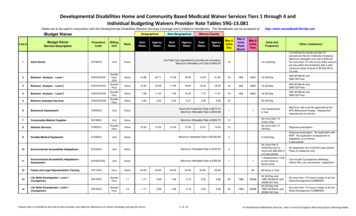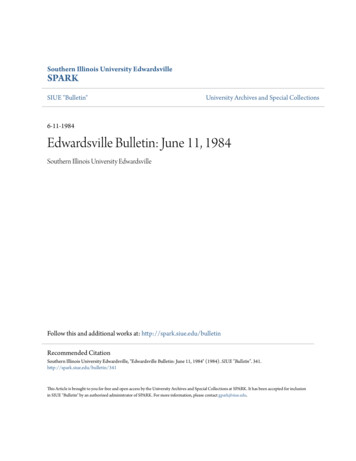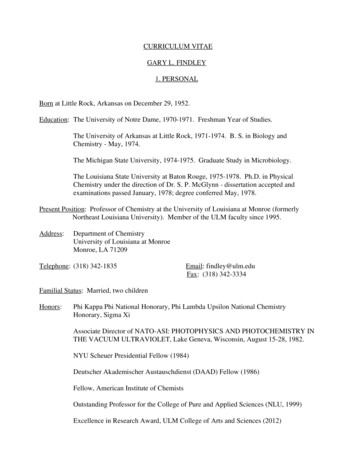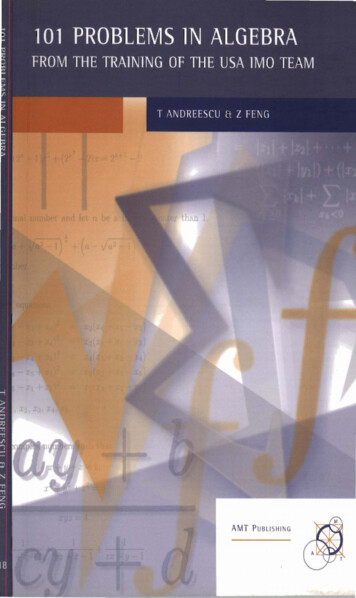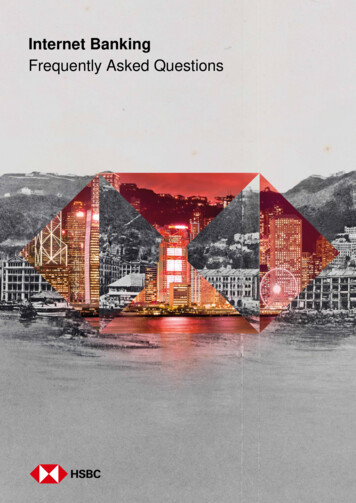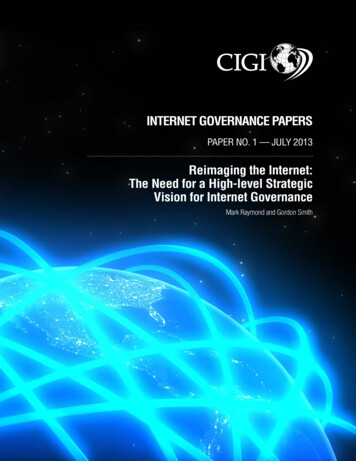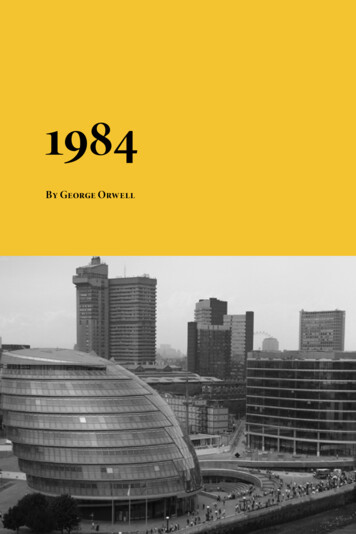
Transcription
1984By George OrwellDownload free eBooks of classic literature, books andnovels at Planet eBook. Subscribe to our free eBooks blogand email newsletter.
Part One 1984
Chapter 1It was a bright cold day in April, and the clocks were striking thirteen. Winston Smith, his chin nuzzled into hisbreast in an effort to escape the vile wind, slipped quicklythrough the glass doors of Victory Mansions, though notquickly enough to prevent a swirl of gritty dust from entering along with him.The hallway smelt of boiled cabbage and old rag mats. Atone end of it a coloured poster, too large for indoor display,had been tacked to the wall. It depicted simply an enormous face, more than a metre wide: the face of a man ofabout forty-five, with a heavy black moustache and ruggedly handsome features. Winston made for the stairs. It wasno use trying the lift. Even at the best of times it was seldom working, and at present the electric current was cutoff during daylight hours. It was part of the economy drivein preparation for Hate Week. The flat was seven flights up,and Winston, who was thirty-nine and had a varicose ulcerabove his right ankle, went slowly, resting several times onthe way. On each landing, opposite the lift-shaft, the posterwith the enormous face gazed from the wall. It was one ofthose pictures which are so contrived that the eyes followyou about when you move. BIG BROTHER IS WATCHINGYOU, the caption beneath it ran.Inside the flat a fruity voice was reading out a list of figFree eBooks at Planet eBook.com
ures which had something to do with the production ofpig-iron. The voice came from an oblong metal plaque likea dulled mirror which formed part of the surface of theright-hand wall. Winston turned a switch and the voicesank somewhat, though the words were still distinguishable. The instrument (the telescreen, it was called) could bedimmed, but there was no way of shutting it off completely. He moved over to the window: a smallish, frail figure,the meagreness of his body merely emphasized by the blueoveralls which were the uniform of the party. His hair wasvery fair, his face naturally sanguine, his skin roughened bycoarse soap and blunt razor blades and the cold of the winter that had just ended.Outside, even through the shut window-pane, the worldlooked cold. Down in the street little eddies of wind werewhirling dust and torn paper into spirals, and though thesun was shining and the sky a harsh blue, there seemedto be no colour in anything, except the posters that wereplastered everywhere. The blackmoustachio’d face gazeddown from every commanding corner. There was one onthe house-front immediately opposite. BIG BROTHER ISWATCHING YOU, the caption said, while the dark eyeslooked deep into Winston’s own. Down at street level another poster, torn at one corner, flapped fitfully in the wind,alternately covering and uncovering the single word INGSOC. In the far distance a helicopter skimmed downbetween the roofs, hovered for an instant like a bluebottle,and darted away again with a curving flight. It was the police patrol, snooping into people’s windows. The patrols did 1984
not matter, however. Only the Thought Police mattered.Behind Winston’s back the voice from the telescreen wasstill babbling away about pig-iron and the overfulfilmentof the Ninth Three-Year Plan. The telescreen received andtransmitted simultaneously. Any sound that Winston made,above the level of a very low whisper, would be picked up byit, moreover, so long as he remained within the field of vision which the metal plaque commanded, he could be seenas well as heard. There was of course no way of knowingwhether you were being watched at any given moment. Howoften, or on what system, the Thought Police plugged in onany individual wire was guesswork. It was even conceivablethat they watched everybody all the time. But at any ratethey could plug in your wire whenever they wanted to. Youhad to live—did live, from habit that became instinct—inthe assumption that every sound you made was overheard,and, except in darkness, every movement scrutinized.Winston kept his back turned to the telescreen. It wassafer, though, as he well knew, even a back can be revealing.A kilometre away the Ministry of Truth, his place of work,towered vast and white above the grimy landscape. This,he thought with a sort of vague distaste—this was London,chief city of Airstrip One, itself the third most populousof the provinces of Oceania. He tried to squeeze out somechildhood memory that should tell him whether Londonhad always been quite like this. Were there always these vistas of rotting nineteenth-century houses, their sides shoredup with baulks of timber, their windows patched with cardboard and their roofs with corrugated iron, their crazyFree eBooks at Planet eBook.com
garden walls sagging in all directions? And the bombedsites where the plaster dust swirled in the air and the willow-herb straggled over the heaps of rubble; and the placeswhere the bombs had cleared a larger patch and there hadsprung up sordid colonies of wooden dwellings like chicken-houses? But it was no use, he could not remember:nothing remained of his childhood except a series of brightlit tableaux occurring against no background and mostlyunintelligible.The Ministry of Truth—Minitrue, in Newspeak [Newspeak was the official language of Oceania. For an accountof its structure and etymology see Appendix.]—was startlingly different from any other object in sight. It was anenormous pyramidal structure of glittering white concrete, soaring up, terrace after terrace, 300 metres into theair. From where Winston stood it was just possible to read,picked out on its white face in elegant lettering, the threeslogans of the Party:WAR IS PEACEFREEDOM IS SLAVERYIGNORANCE IS STRENGTHThe Ministry of Truth contained, it was said, threethousand rooms above ground level, and correspondingramifications below. Scattered about London there werejust three other buildings of similar appearance and size.So completely did they dwarf the surrounding architecture that from the roof of Victory Mansions you could see 1984
all four of them simultaneously. They were the homes ofthe four Ministries between which the entire apparatusof government was divided. The Ministry of Truth, whichconcerned itself with news, entertainment, education, andthe fine arts. The Ministry of Peace, which concerned itselfwith war. The Ministry of Love, which maintained law andorder. And the Ministry of Plenty, which was responsiblefor economic affairs. Their names, in Newspeak: Minitrue,Minipax, Miniluv, and Miniplenty.The Ministry of Love was the really frightening one.There were no windows in it at all. Winston had never beeninside the Ministry of Love, nor within half a kilometre of it.It was a place impossible to enter except on official business,and then only by penetrating through a maze of barbedwire entanglements, steel doors, and hidden machine-gunnests. Even the streets leading up to its outer barriers wereroamed by gorilla-faced guards in black uniforms, armedwith jointed truncheons.Winston turned round abruptly. He had set his featuresinto the expression of quiet optimism which it was advisable to wear when facing the telescreen. He crossed theroom into the tiny kitchen. By leaving the Ministry at thistime of day he had sacrificed his lunch in the canteen, andhe was aware that there was no food in the kitchen excepta hunk of dark-coloured bread which had got to be savedfor tomorrow’s breakfast. He took down from the shelf abottle of colourless liquid with a plain white label markedVICTORY GIN. It gave off a sickly, oily smell, as of Chineserice-spirit. Winston poured out nearly a teacupful, nervedFree eBooks at Planet eBook.com
himself for a shock, and gulped it down like a dose of medicine.Instantly his face turned scarlet and the water ran outof his eyes. The stuff was like nitric acid, and moreover, inswallowing it one had the sensation of being hit on the backof the head with a rubber club. The next moment, however,the burning in his belly died down and the world began tolook more cheerful. He took a cigarette from a crumpledpacket marked VICTORY CIGARETTES and incautiouslyheld it upright, whereupon the tobacco fell out on to thefloor. With the next he was more successful. He went backto the living-room and sat down at a small table that stoodto the left of the telescreen. From the table drawer he tookout a penholder, a bottle of ink, and a thick, quarto-sizedblank book with a red back and a marbled cover.For some reason the telescreen in the living-room was inan unusual position. Instead of being placed, as was normal,in the end wall, where it could command the whole room,it was in the longer wall, opposite the window. To one sideof it there was a shallow alcove in which Winston was nowsitting, and which, when the flats were built, had probablybeen intended to hold bookshelves. By sitting in the alcove,and keeping well back, Winston was able to remain outsidethe range of the telescreen, so far as sight went. He couldbe heard, of course, but so long as he stayed in his presentposition he could not be seen. It was partly the unusual geography of the room that had suggested to him the thingthat he was now about to do.But it had also been suggested by the book that he had 1984
just taken out of the drawer. It was a peculiarly beautifulbook. Its smooth creamy paper, a little yellowed by age, wasof a kind that had not been manufactured for at least forty years past. He could guess, however, that the book wasmuch older than that. He had seen it lying in the window ofa frowsy little junk-shop in a slummy quarter of the town(just what quarter he did not now remember) and had beenstricken immediately by an overwhelming desire to possessit. Party members were supposed not to go into ordinaryshops (’dealing on the free market’, it was called), but therule was not strictly kept, because there were various things,such as shoelaces and razor blades, which it was impossibleto get hold of in any other way. He had given a quick glanceup and down the street and then had slipped inside andbought the book for two dollars fifty. At the time he was notconscious of wanting it for any particular purpose. He hadcarried it guiltily home in his briefcase. Even with nothingwritten in it, it was a compromising possession.The thing that he was about to do was to open a diary.This was not illegal (nothing was illegal, since there were nolonger any laws), but if detected it was reasonably certainthat it would be punished by death, or at least by twentyfive years in a forced-labour camp. Winston fitted a nib intothe penholder and sucked it to get the grease off. The penwas an archaic instrument, seldom used even for signatures,and he had procured one, furtively and with some difficulty,simply because of a feeling that the beautiful creamy paperdeserved to be written on with a real nib instead of beingscratched with an ink-pencil. Actually he was not used toFree eBooks at Planet eBook.com
writing by hand. Apart from very short notes, it was usual to dictate everything into the speak-write which was ofcourse impossible for his present purpose. He dipped thepen into the ink and then faltered for just a second. A tremor had gone through his bowels. To mark the paper was thedecisive act. In small clumsy letters he wrote:April 4th, 1984.He sat back. A sense of complete helplessness had descended upon him. To begin with, he did not know with anycertainty that this was 1984. It must be round about thatdate, since he was fairly sure that his age was thirty-nine,and he believed that he had been born in 1944 or 1945; butit was never possible nowadays to pin down any date withina year or two.For whom, it suddenly occurred to him to wonder, was hewriting this diary? For the future, for the unborn. His mindhovered for a moment round the doubtful date on the page,and then fetched up with a bump against the Newspeakword DOUBLETHINK. For the first time the magnitude ofwhat he had undertaken came home to him. How could youcommunicate with the future? It was of its nature impossible. Either the future would resemble the present, in whichcase it would not listen to him: or it would be different fromit, and his predicament would be meaningless.For some time he sat gazing stupidly at the paper. Thetelescreen had changed over to strident military music. Itwas curious that he seemed not merely to have lost the pow101984
er of expressing himself, but even to have forgotten what itwas that he had originally intended to say. For weeks pasthe had been making ready for this moment, and it had never crossed his mind that anything would be needed exceptcourage. The actual writing would be easy. All he had todo was to transfer to paper the interminable restless monologue that had been running inside his head, literally foryears. At this moment, however, even the monologue haddried up. Moreover his varicose ulcer had begun itchingunbearably. He dared not scratch it, because if he did so italways became inflamed. The seconds were ticking by. Hewas conscious of nothing except the blankness of the pagein front of him, the itching of the skin above his ankle, theblaring of the music, and a slight booziness caused by thegin.Suddenly he began writing in sheer panic, only imperfectly aware of what he was setting down. His small butchildish handwriting straggled up and down the page, shedding first its capital letters and finally even its full stops:April 4th, 1984. Last night to the flicks. All war films. Onevery good one of a ship full of refugees being bombedsomewhere in the Mediterranean. Audience much amusedby shots of a great huge fat man trying to swim away witha helicopter after him, first you saw him wallowing alongin the water like a porpoise, then you saw him through thehelicopters gunsights, then he was full of holes and the searound him turned pink and he sank as suddenly as thoughthe holes had let in the water, audience shouting with laughterFree eBooks at Planet eBook.com11
when he sank. then you saw a lifeboat full of children with ahelicopter hovering over it. there was a middle-aged womanmight have been a jewess sitting up in the bow with a littleboy about three years old in her arms. little boy screamingwith fright and hiding his head between her breasts as if hewas trying to burrow right into her and the woman puttingher arms round him and comforting him although she wasblue with fright herself, all the time covering him up as muchas possible as if she thought her arms could keep the bulletsoff him. then the helicopter planted a 20 kilo bomb in amongthem terrific flash and the boat went all to matchwood. thenthere was a wonderful shot of a child’s arm going up up upright up into the air a helicopter with a camera in its nosemust have followed it up and there was a lot of applause fromthe party seats but a woman down in the prole part of thehouse suddenly started kicking up a fuss and shouting theydidnt oughter of showed it not in front of kids they didnt itaint right not in front of kids it aint until the police turnedher turned her out i dont suppose anything happened to hernobody cares what the proles say typical prole reaction theynever——Winston stopped writing, partly because he was suffering from cramp. He did not know what had made him pourout this stream of rubbish. But the curious thing was thatwhile he was doing so a totally different memory had clarified itself in his mind, to the point where he almost feltequal to writing it down. It was, he now realized, becauseof this other incident that he had suddenly decided to come121984
home and begin the diary today.It had happened that morning at the Ministry, if anything so nebulous could be said to happen.It was nearly eleven hundred, and in the Records Department, where Winston worked, they were dragging thechairs out of the cubicles and grouping them in the centre of the hall opposite the big telescreen, in preparation forthe Two Minutes Hate. Winston was just taking his placein one of the middle rows when two people whom he knewby sight, but had never spoken to, came unexpectedly intothe room. One of them was a girl whom he often passed inthe corridors. He did not know her name, but he knew thatshe worked in the Fiction Department. Presumably—sincehe had sometimes seen her with oily hands and carrying aspanner—she had some mechanical job on one of the novel-writing machines. She was a bold-looking girl, of abouttwenty-seven, with thick hair, a freckled face, and swift,athletic movements. A narrow scarlet sash, emblem of theJunior Anti-Sex League, was wound several times roundthe waist of her overalls, just tightly enough to bring out theshapeliness of her hips. Winston had disliked her from thevery first moment of seeing her. He knew the reason. It wasbecause of the atmosphere of hockey-fields and cold bathsand community hikes and general clean-mindedness whichshe managed to carry about with her. He disliked nearly allwomen, and especially the young and pretty ones. It was always the women, and above all the young ones, who werethe most bigoted adherents of the Party, the swallowersof slogans, the amateur spies and nosers-out of unorthoFree eBooks at Planet eBook.com13
doxy. But this particular girl gave him the impression ofbeing more dangerous than most. Once when they passedin the corridor she gave him a quick sidelong glance whichseemed to pierce right into him and for a moment had filledhim with black terror. The idea had even crossed his mindthat she might be an agent of the Thought Police. That, itwas true, was very unlikely. Still, he continued to feel a peculiar uneasiness, which had fear mixed up in it as well ashostility, whenever she was anywhere near him.The other person was a man named O’Brien, a memberof the Inner Party and holder of some post so importantand remote that Winston had only a dim idea of its nature.A momentary hush passed over the group of people roundthe chairs as they saw the black overalls of an Inner Partymember approaching. O’Brien was a large, burly man witha thick neck and a coarse, humorous, brutal face. In spite ofhis formidable appearance he had a certain charm of manner. He had a trick of resettling his spectacles on his nosewhich was curiously disarming—in some indefinable way,curiously civilized. It was a gesture which, if anyone hadstill thought in such terms, might have recalled an eighteenth-century nobleman offering his snuffbox. Winstonhad seen O’Brien perhaps a dozen times in almost as manyyears. He felt deeply drawn to him, and not solely becausehe was intrigued by the contrast between O’Brien’s urbanemanner and his prize-fighter’s physique. Much more it wasbecause of a secretly held belief—or perhaps not even a belief, merely a hope—that O’Brien’s political orthodoxy wasnot perfect. Something in his face suggested it irresistibly.141984
And again, perhaps it was not even unorthodoxy that waswritten in his face, but simply intelligence. But at any ratehe had the appearance of being a person that you couldtalk to if somehow you could cheat the telescreen and gethim alone. Winston had never made the smallest effort toverify this guess: indeed, there was no way of doing so. Atthis moment O’Brien glanced at his wrist-watch, saw that itwas nearly eleven hundred, and evidently decided to stay inthe Records Department until the Two Minutes Hate wasover. He took a chair in the same row as Winston, a coupleof places away. A small, sandy-haired woman who workedin the next cubicle to Winston was between them. The girlwith dark hair was sitting immediately behind.The next moment a hideous, grinding speech, as of somemonstrous machine running without oil, burst from thebig telescreen at the end of the room. It was a noise that setone’s teeth on edge and bristled the hair at the back of one’sneck. The Hate had started.As usual, the face of Emmanuel Goldstein, the Enemy ofthe People, had flashed on to the screen. There were hisseshere and there among the audience. The little sandy-hairedwoman gave a squeak of mingled fear and disgust. Goldstein was the renegade and backslider who once, long ago(how long ago, nobody quite remembered), had been one ofthe leading figures of the Party, almost on a level with BigBrother himself, and then had engaged in counter-revolutionary activities, had been condemned to death, and hadmysteriously escaped and disappeared. The programmes ofthe Two Minutes Hate varied from day to day, but there wasFree eBooks at Planet eBook.com15
none in which Goldstein was not the principal figure. Hewas the primal traitor, the earliest defiler of the Party’s purity. All subsequent crimes against the Party, all treacheries,acts of sabotage, heresies, deviations, sprang directly outof his teaching. Somewhere or other he was still alive andhatching his conspiracies: perhaps somewhere beyond thesea, under the protection of his foreign paymasters, perhapseven—so it was occasionally rumoured—in some hidingplace in Oceania itself.Winston’s diaphragm was constricted. He could neversee the face of Goldstein without a painful mixture of emotions. It was a lean Jewish face, with a great fuzzy aureole ofwhite hair and a small goatee beard—a clever face, and yetsomehow inherently despicable, with a kind of senile silliness in the long thin nose, near the end of which a pairof spectacles was perched. It resembled the face of a sheep,and the voice, too, had a sheep-like quality. Goldstein wasdelivering his usual venomous attack upon the doctrinesof the Party—an attack so exaggerated and perverse that achild should have been able to see through it, and yet justplausible enough to fill one with an alarmed feeling thatother people, less level-headed than oneself, might be takenin by it. He was abusing Big Brother, he was denouncingthe dictatorship of the Party, he was demanding the immediate conclusion of peace with Eurasia, he was advocatingfreedom of speech, freedom of the Press, freedom of assembly, freedom of thought, he was crying hysterically thatthe revolution had been betrayed—and all this in rapidpolysyllabic speech which was a sort of parody of the ha161984
bitual style of the orators of the Party, and even containedNewspeak words: more Newspeak words, indeed, than anyParty member would normally use in real life. And all thewhile, lest one should be in any doubt as to the reality whichGoldstein’s specious claptrap covered, behind his head onthe telescreen there marched the endless columns of theEurasian army—row after row of solid-looking men withexpressionless Asiatic faces, who swam up to the surfaceof the screen and vanished, to be replaced by others exactly similar. The dull rhythmic tramp of the soldiers’ bootsformed the background to Goldstein’s bleating voice.Before the Hate had proceeded for thirty seconds, uncontrollable exclamations of rage were breaking out from halfthe people in the room. The self-satisfied sheep-like face onthe screen, and the terrifying power of the Eurasian armybehind it, were too much to be borne: besides, the sight oreven the thought of Goldstein produced fear and anger automatically. He was an object of hatred more constant thaneither Eurasia or Eastasia, since when Oceania was at warwith one of these Powers it was generally at peace with theother. But what was strange was that although Goldsteinwas hated and despised by everybody, although every dayand a thousand times a day, on platforms, on the telescreen,in newspapers, in books, his theories were refuted, smashed,ridiculed, held up to the general gaze for the pitiful rubbish that they were—in spite of all this, his influence neverseemed to grow less. Always there were fresh dupes waitingto be seduced by him. A day never passed when spies andsaboteurs acting under his directions were not unmaskedFree eBooks at Planet eBook.com17
by the Thought Police. He was the commander of a vastshadowy army, an underground network of conspiratorsdedicated to the overthrow of the State. The Brotherhood,its name was supposed to be. There were also whisperedstories of a terrible book, a compendium of all the heresies,of which Goldstein was the author and which circulatedclandestinely here and there. It was a book without a title.People referred to it, if at all, simply as THE BOOK. But oneknew of such things only through vague rumours. Neitherthe Brotherhood nor THE BOOK was a subject that any ordinary Party member would mention if there was a way ofavoiding it.In its second minute the Hate rose to a frenzy. Peoplewere leaping up and down in their places and shoutingat the tops of their voices in an effort to drown the maddening bleating voice that came from the screen. Thelittle sandy-haired woman had turned bright pink, andher mouth was opening and shutting like that of a landedfish. Even O’Brien’s heavy face was flushed. He was sittingvery straight in his chair, his powerful chest swelling andquivering as though he were standing up to the assault of awave. The dark-haired girl behind Winston had begun crying out ‘Swine! Swine! Swine!’ and suddenly she picked upa heavy Newspeak dictionary and flung it at the screen. Itstruck Goldstein’s nose and bounced off; the voice continued inexorably. In a lucid moment Winston found that hewas shouting with the others and kicking his heel violently against the rung of his chair. The horrible thing aboutthe Two Minutes Hate was not that one was obliged to act181984
a part, but, on the contrary, that it was impossible to avoidjoining in. Within thirty seconds any pretence was alwaysunnecessary. A hideous ecstasy of fear and vindictiveness,a desire to kill, to torture, to smash faces in with a sledgehammer, seemed to flow through the whole group of peoplelike an electric current, turning one even against one’s willinto a grimacing, screaming lunatic. And yet the rage thatone felt was an abstract, undirected emotion which couldbe switched from one object to another like the flame of ablowlamp. Thus, at one moment Winston’s hatred was notturned against Goldstein at all, but, on the contrary, againstBig Brother, the Party, and the Thought Police; and at suchmoments his heart went out to the lonely, derided hereticon the screen, sole guardian of truth and sanity in a worldof lies. And yet the very next instant he was at one with thepeople about him, and all that was said of Goldstein seemedto him to be true. At those moments his secret loathing ofBig Brother changed into adoration, and Big Brother seemedto tower up, an invincible, fearless protector, standing likea rock against the hordes of Asia, and Goldstein, in spiteof his isolation, his helplessness, and the doubt that hungabout his very existence, seemed like some sinister enchanter, capable by the mere power of his voice of wrecking thestructure of civilization.It was even possible, at moments, to switch one’s hatred this way or that by a voluntary act. Suddenly, by thesort of violent effort with which one wrenches one’s headaway from the pillow in a nightmare, Winston succeededin transferring his hatred from the face on the screen toFree eBooks at Planet eBook.com19
the dark-haired girl behind him. Vivid, beautiful hallucinations flashed through his mind. He would flog her to deathwith a rubber truncheon. He would tie her naked to a stakeand shoot her full of arrows like Saint Sebastian. He wouldravish her and cut her throat at the moment of climax. Better than before, moreover, he realized WHY it was that hehated her. He hated her because she was young and prettyand sexless, because he wanted to go to bed with her andwould never do so, because round her sweet supple waist,which seemed to ask you to encircle it with your arm, therewas only the odious scarlet sash, aggressive symbol of chastity.The Hate rose to its climax. The voice of Goldstein hadbecome an actual sheep’s bleat, and for an instant the facechanged into that of a sheep. Then the sheep-face melted intothe figure of a Eurasian soldier who seemed to be advancing,huge and terrible, his sub-machine gun roaring, and seeming to spring out of the surface of the screen, so that someof the people in the front row actually flinched backwardsin their seats. But in the same moment, drawing a deep sighof relief from everybody, the hostile figure melted into theface of Big Brother, black-haired, black-moustachio’d, fullof power and mysterious calm, and so vast that it almostfilled up the screen. Nobody heard what Big Brother wassaying. It was merely a few words of encouragement, thesort of words that are uttered in the din of battle, not distinguishable individually but restoring confidence by the factof being spoken. Then the face of Big Brother faded awayagain, and instead the three slogans of the Party stood out201984
in bold capitals:WAR IS PEACEFREEDOM IS SLAVERYIGNORANCE IS STRENGTHBut the face of Big Brother seemed to persist for several seconds on the screen, as though the impact that it hadmade on everyone’s eyeballs was too vivid to wear off immediately. The little sandy-haired woman had flung herselfforward over the back of the chair in front of her. With atremulous murmur that sounded like ‘My Saviour!’ she extended her arms towards the screen. Then she buried herface in her hands. It was apparent that she was uttering aprayer.At this moment the entire group of people broke into adeep, slow, rhythmical chant of ‘B-B!.B-B!’—over and overagain, very slowly, with a long pause between the first ‘B’and the second—a heavy, murmurous sound, somehowcuriously savage, in the background of which one seemedto hear the stamp of naked feet and the throbbing of tomtoms. For perhaps as much as thirty seconds they kept itup. It was a refrain that was often heard in moments ofoverwhelming emotion. Partly it was a sort of hymn to thewisdom and majesty of Big Brother, but still more it wasan ac
Download free eBooks of classic literature, books and novels at Planet eBook. Subscribe to our free eBooks blog . low-herb straggled over the heaps of rubble; and the places . Free eBooks at Planet eBook.com 9 just taken out of the drawer. It was a peculiarly beautiful book. I
